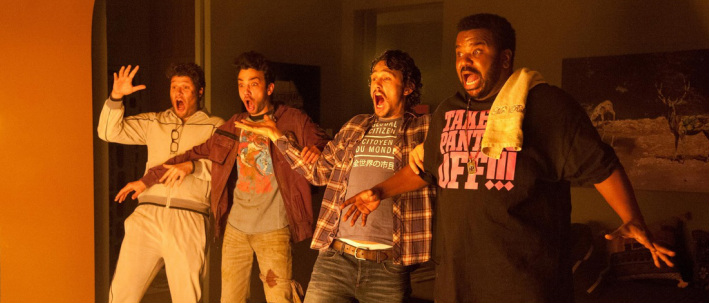The set-up is simple enough: While visiting pal Seth Rogen in LA, Jay Baruchel is struggling to enjoy the celebrity culture he purposefully tried to escape. Seth suggests that they attend James Franco’s housewarming party, insisting it will be a good time and if Jay doesn’t like it, they can leave. Later at the party (hilariously peppered with fun cameos and outrageous situations) Jay isn’t having a good time. He steps out to get some air, Seth follows him, and the apocalypse begins.
The surprise of the film isn't that the actors so winningly played hyper-realized versions of their public images (or countered them entirely, in the case of depraved!Michael Cera), but that multiple times throughout I caught myself thinking, "Wow, they really just went there." Though pushing boundaries that genuinely shocked (there is a scene where the guys accidentally play soccer with a guy's freshly severed head; later a devil rendered in such a way so as to leave nothing to the imagination) the moments were "realistic" in the sense that they might have actually happened to a group of actors suddenly caught trapped at the end of the world. Rogen and Goldberg know how the public perceives them; they present the party from the point of view of someone who assumes that celebrity parties are nothing but raucousness and debauchery. It’s a credit to their keenly observed script that it’s believable when Franco’s fortress of a house keeps the partygoers from sensing their dire situation.
The humor thrives against its played-straight apocalyptic backdrop. Much like the style of Edgar Wright's Three Flavors Cornetto trilogy (Shawn of the Dead, Hot Fuzz, the upcoming The World's End) the humor is in the pathos, not the situation. Because we understand that, yes, the world is in fact over (and there is little doubt from the scope of the destruction), and how (it's not aliens or another LA earthquake but the genuine, literal Armageddon), it's not a question of "how will our heroes survive?" but actually, "Do they deserve to?"
Perhaps the most jarring element is the early, straight-faced adoption of religious imagery and language (Franco quips, "Did you steal my Bible?" which immediately led me to wonder if the actual James Franco owns one, and was quickly followed by the humbling revelation that I know nothing about the private lives of these real people). So rarely do we see religiosity depicted seriously or respectfully that seeing it here equally mimics the gorier did-the-just-go-there feeling. It's all done from the perspective of many who fall into the Millennial demographic: maybe God exists, but I don't give the idea much thought; I just try my best to go through life without being too much of an asshole. “God” is never shown. This was the smart choice because it's not a film about whether God has the right to judge; it's a film about what happens when it's a given that he does.
The real villain is vanity, embodied by the Hollywood lifestyle of parties, excess, and petty pleasures. Though this group of actors is playing themselves, the film might be better understood as a morality play. Each character is a vice: Rogen is cowardice; Hill is ego (nodding again and again to his Oscar nomination for Moneyball); Franco is some mix of manipulation and selfishness. Danny McBride plays the character he always plays (grating, vulgar, self-involved) but to greater use and effect in the context of a world where those things could actually be assets.
Despite its semi-serious message, Rogen and Goldberg's script stays firmly on the entertaining side. The directing is confident and the lesson so ingrained that it could go unnoticed if the viewer only wanted to see a comedy. And though they poke fun at their own celebrity, there is a larger thought experiment happening about the worthiness of what they do as entertainers, even as they become successful. The film smartly asks how anyone who lives for themselves, even justifiably ("It's not like we didn't work for everything we have!"), could possibly be given admission to Heaven.
The answer might surprise a certain vocal American subset with its accuracy, if they didn't mind finding it among epic fights about jizz and not-subtle cannibalism. After all, hell on earth isn't pretty, and Rogen and friends make no attempts to pretend it isn't. Smart viewers will realize that the punch line is that no one realized the apocalypse had happened because of Franco's raging party, which says a lot about our current frame of mind in relation to celebrity culture. We might all just be partying at James Franco’s.


 RSS Feed
RSS Feed
